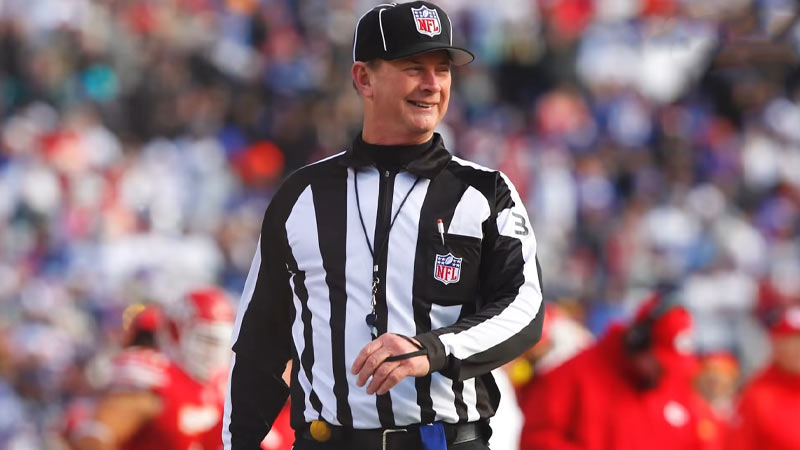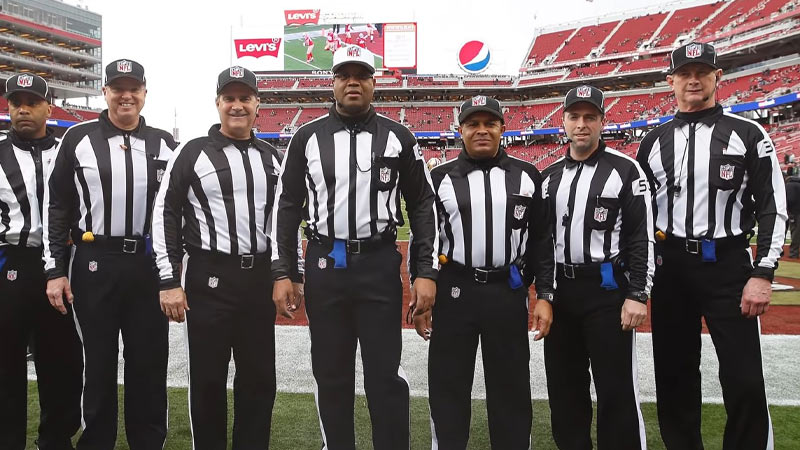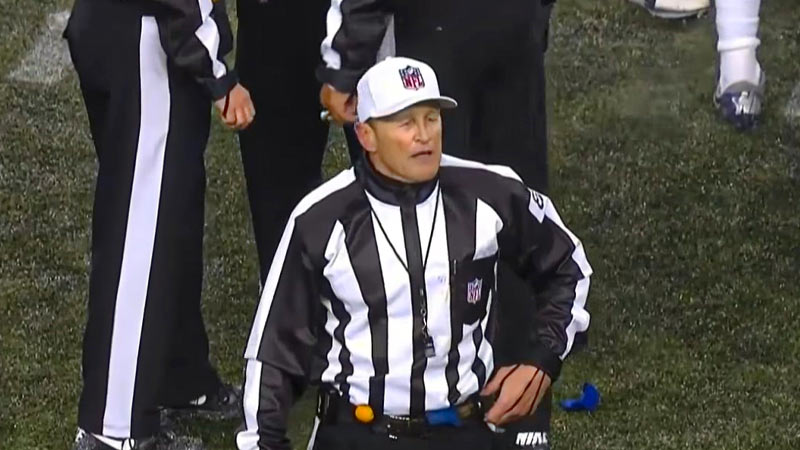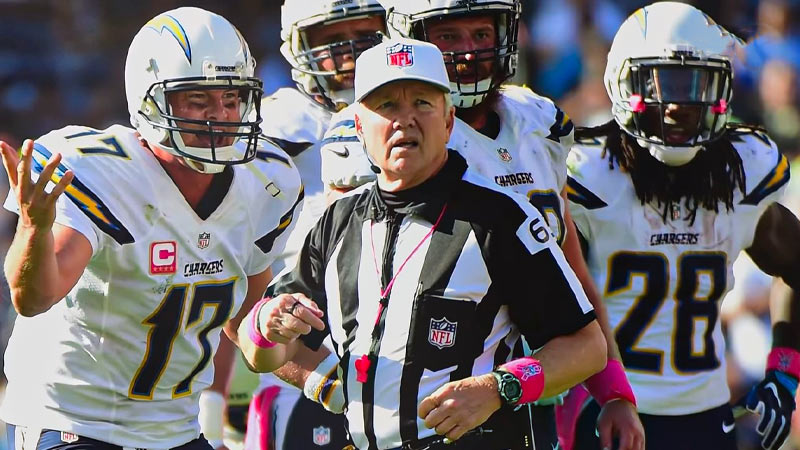In the world of professional sports, NFL referees are often the unsung heroes who ensure fair play and maintain the integrity of the game. Yet, their earnings have long been a subject of curiosity and speculation.
In this blog post, we dive into how much does an NFL referee make, shedding light on what these officials make and how their compensation is structured.
As we explore the topic, we’ll uncover the factors that influence an NFL referee’s income, from per-game fees and base salaries to performance-based bonuses.
You’ll gain insight into why some referees earn more than others and discover the additional perks that come with officiating at the highest level of American football.
Whether you’re a die-hard football fan or simply curious about the financial side of the game, this post aims to provide a comprehensive overview of how much NFL referees truly make. So, stay sharp.
The Basics of NFL Refereeing
NFL refereeing is a complex and highly scrutinized aspect of professional football. Here are four essential points that provide an overview of the basics of NFL refereeing:
Rule Knowledge and Application
NFL referees are responsible for enforcing a comprehensive rulebook that governs all aspects of the game. This includes rules related to player conduct, penalties, scoring, and the mechanics of the game itself.
Referees must have an in-depth understanding of these rules and their interpretations to make accurate calls during games.
Officiating Crew
An NFL officiating crew consists of seven on-field officials, each with specific responsibilities. The crew typically includes the referee, umpire, down judge, line judge, field judge, side judge, and back judge.
Each official has a designated area of the field to oversee and specific duties, such as monitoring player safety, tracking the game clock, and ensuring fair play.
Instant Replay Review
In the NFL, certain plays can be challenged by coaches or reviewed by the league’s replay officials. Referees play a crucial role in this process by making the final decision on challenged plays.
They review video footage on the sideline to determine if a call on the field should be upheld, overturned, or modified based on the evidence available.
Communication and Signalization
Effective communication is vital for NFL referees to convey decisions to players, coaches, and the viewing audience. They use a series of hand signals and verbal announcements to indicate penalties, scoring plays, and other key game events.
Clear and concise communication helps maintain order on the field and ensures that everyone understands the decisions made by the officiating crew.
Game Management and Player Safety
NFL referees are responsible for maintaining control of the game, ensuring player safety, and managing the pace of play. They monitor player conduct, enforce rules designed to protect players from unnecessary risks and help maintain fair competition.
Referees also play a role in managing the game clock and ensuring that it runs smoothly, especially during critical moments such as the two-minute warning and the end of each half.
In addition to these basics, NFL referees undergo extensive training and evaluations to maintain the highest standards of officiating.
How Much Does An NFL Referee Make?

NFL referee salaries can vary based on their experience and the specific roles they hold within the officiating crew. While the NFL does not publicly disclose referee salaries, estimates are available from various sources. Here are some approximate figures:
Average Salary
NFL referees, on average, typically make around $205,000 per year. This figure represents the median salary for officials in the league.
Highest-Paid Referees
The highest-paid NFL referees can earn significantly more. According to Sporting News and other sources, the top-tier officials can make up to $250,000 annually.
It’s important to note that these figures are approximate and can change over time due to negotiations between the NFL and the NFL Referees Association.
Salaries may also vary based on factors like years of experience, position within the officiating crew, and performance evaluations.
Salary Structure of An NFL Referee
While the NFL does not publicly disclose the detailed salary structure of its referees, here is a general overview of how the compensation for NFL referees is structured:
Per Game Fee
NFL referees and their officiating crew members receive a per-game fee for their services. This fee can vary based on factors such as their experience, position within the crew, and seniority.
The per-game fee typically includes compensation for regular-season games, playoff games, and the Super Bowl.
Base Salary
In addition to the per-game fees, NFL referees also receive a base salary. This base salary provides them with a consistent income throughout the year, even during the offseason when there are no games being played.
Bonuses
NFL referees may be eligible for various performance-based bonuses. For example, they can receive bonuses for officiating postseason games, such as wild-card games, divisional playoffs, conference championships, and the Super Bowl.
Additionally, referees who perform exceptionally well and consistently receive high-performance ratings may earn additional bonuses.
Travel Expenses
The NFL covers travel expenses for referees and their officiating crews, including transportation, lodging, and meals, for games that require travel. This ensures that referees can focus on their duties without being burdened by travel costs.
Pension and Benefits
NFL referees, like other employees, may be eligible for retirement benefits, healthcare benefits, and other perks as part of their compensation package.
Officiating Clinic Pay
Referees are typically required to attend off-season officiating clinics and training sessions to stay updated on rule changes and improve their skills. They receive compensation for attending these mandatory clinics.
It’s important to note that the exact details of the salary structure can vary from year to year based on the collective bargaining agreements (CBAs) between the NFL and the NFL Referees Association.
These CBAs outline the terms and conditions of employment, including compensation, benefits, and other relevant factors.
Controversies and Negotiations of An NFL Referee’s Salary

NFL referee salaries have been the subject of several controversies and negotiations over the years. Here are some key points regarding controversies and negotiations related to NFL referee salaries:
Labor Disputes and Lockouts
One of the most notable controversies in recent years occurred in 2012 when a labor dispute between the NFL and the NFL Referees Association led to a lockout.
During this dispute, replacement officials were used for the first three weeks of the regular season, leading to numerous officiating errors and widespread criticism.
The controversy highlighted the importance of experienced and skilled referees and put pressure on the NFL to reach a new labor agreement.
Collective Bargaining Agreements (CBAs)
Negotiations between the NFL and the NFL Referees Association revolve around the terms and conditions of employment for referees, including their compensation.
CBAs are typically renegotiated periodically, and the terms can vary from one agreement to the next. The negotiations cover various aspects of compensation, such as per-game fees, base salaries, bonuses, and retirement benefits.
Salary Increases
Negotiations often include discussions about salary increases for NFL referees. Both parties aim to find a balance between compensating officials fairly for their expertise and ensuring that the costs are manageable for the league.
Salary increases may be based on factors such as years of experience and performance evaluations.
Performance-Based Pay
The NFL has implemented performance-based pay systems that reward referees for their accuracy and consistency in making calls. These bonuses are designed to incentivize referees to maintain high standards of officiating.
Transparency and Public Scrutiny
Controversies related to NFL referee salaries also stem from the public’s interest in understanding how referees are compensated.
While some basic salary figures are known, the specific details of the compensation structure have often been kept private. This lack of transparency has fueled debates about fairness and accountability.
Retirement Benefits
Negotiations may address retirement benefits, including pension plans and other post-career benefits for referees. These benefits are important for the long-term financial security of officials.
It’s important to note that the specifics of these controversies and negotiations can vary from one labor agreement to another.
The NFL and the NFL Referees Association work to find common ground on these issues to ensure that the league continues to have experienced and skilled officials on the field.
Highest-Paid NFL Referees

While the specific salaries of NFL referees are typically not publicly disclosed by the league, there have been reports and estimates regarding the compensation of certain experienced and highly regarded officials.
Here’s an elaboration on some of the highest-paid NFL referees:
Walt Anderson – $250,000 (yearly)
- Walt Anderson is known for his extensive experience as an NFL official. He has served as both a referee and an umpire during his career.
- His $250,000 annual salary reflects his seniority and reputation as one of the league’s most respected referees.
- Anderson has officiated numerous high-profile games, including playoff matchups, which have contributed to his status as one of the top-paid officials in the NFL.
Brad Allen – $250,000 (yearly)
- Brad Allen has gained recognition for his consistent and reliable officiating in the NFL.
- Like Walt Anderson, his $250,000 annual salary reflects his experience and proficiency in enforcing the league’s rules.
- Allen’s ability to manage games effectively and make accurate calls has led to his higher compensation within the league.
Craig Wrolstad – $250,000 (yearly)
- Craig Wrolstad has built a reputation as a dependable referee known for his fair and consistent officiating.
- His annual salary of $250,000 places him among the highest-paid NFL referees.
- Wrolstad’s experience and ability to officiate games effectively, particularly in high-stakes situations, have contributed to his elevated compensation.
Tony Corrente – $230,000 (yearly)
- Tony Corrente is another experienced NFL referee who has consistently demonstrated his proficiency in making accurate calls.
- His annual salary of $230,000 reflects his seniority and standing within the league.
- Corrente’s ability to maintain control of games and ensure fair play has led to his status as one of the league’s well-compensated officials.
Byron Boston – $205,000 (yearly)
- Byron Boston, with an annual salary of $205,000, represents the mid-range of compensation among NFL referees.
- While he may not be among the highest-paid, Boston’s dedication to officiating and adherence to the league’s rules have earned him a solid reputation in the NFL.
The compensation of NFL referees can depend on various factors, including years of experience, performance evaluations, roles within officiating crews, and the terms negotiated in collective bargaining agreements.
These referees’ salaries reflect their experience, skill, and ability to maintain the high standards of officiating expected in the NFL.
FAQs
What is the average salary of an NFL referee?
The average salary for an NFL referee is approximately $205,000 per year. However, salaries can vary based on factors like experience, crew position, and performance evaluations.
Do NFL referees receive additional compensation for officiating playoff games?
Yes, NFL referees receive extra pay for officiating postseason games, including wild-card, divisional playoffs, conference championships, and the Super Bowl. This postseason bonus is in addition to their regular-season earnings.
How do NFL referees earn their income?
NFL referees earn income primarily through a combination of per-game fees, base salaries, performance-based bonuses, and other incentives. These elements collectively make up their annual compensation.
Are NFL referees considered full-time employees, or do they have other jobs?
NFL referees are not full-time employees. Most have other professions or careers in addition to their officiating duties in the NFL. Officiating in the NFL is often seen as a part-time commitment.
Can NFL referees negotiate their salaries, and do they have collective bargaining agreements?
Yes, NFL referees negotiate their salaries and terms through collective bargaining agreements (CBAs) with the NFL Referees Association.
These CBAs outline compensation, benefits, and working conditions, and they are renegotiated periodically to ensure fair terms for officials.
Wrapping Up
In the high-stakes world of NFL football, the compensation of referees reflects their experience, expertise, and dedication to the game.
While the league’s policy of not publicly disclosing salaries may shroud some details in mystery, we’ve unveiled key insights into how much an NFL referee makes.
From the average annual income to the bonuses for postseason officiating, it’s clear that NFL referees earn a substantial income for their role in maintaining fair competition.
These dedicated officials, often juggling their duties with other careers, ensure that the game we love continues to be played with integrity and precision.
As the NFL season unfolds, take a moment to appreciate the hard work of these officials who help make every game day a memorable one. Best wishes.







